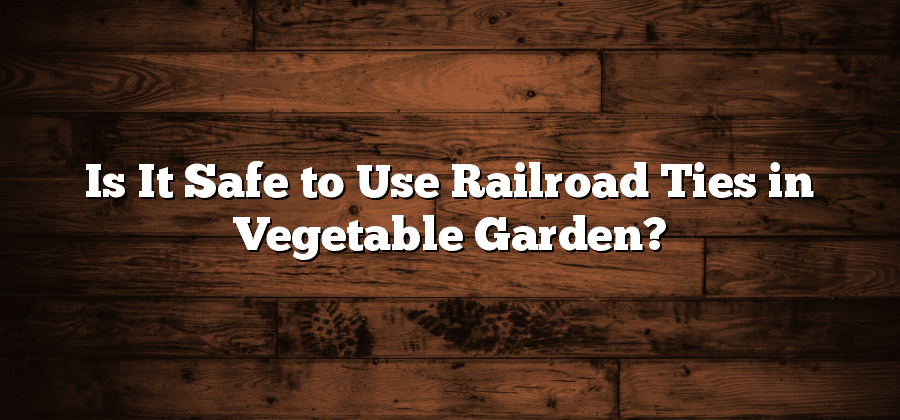Potential Risks of Using Railroad Ties in Vegetable Gardens
Railroad ties, often used for garden bed edging, can pose potential risks when used in vegetable gardens. One of the main concerns is the presence of chemical contaminants in these wooden ties. Railroad ties are treated with creosote, a compound used to protect wood from decay and insects. However, creosote contains harmful substances such as polycyclic aromatic hydrocarbons (PAHs) which can seep into the soil over time.
These chemical contaminants can be absorbed by the plants, leading to possible health concerns for those consuming the vegetables. PAHs are known to be carcinogenic and can have negative effects on human health. Additionally, prolonged exposure to creosote can also be harmful to the gardeners themselves, as contact with the ties or inhaling fumes from the treated wood can cause skin irritation, respiratory problems, and other health issues. It is crucial to carefully consider the potential risks associated with using railroad ties in vegetable gardens before making a decision.
Chemical Contaminants Found in Railroad Ties
Chemical Contaminants Found in Railroad Ties
Railroad ties, commonly used in garden bed edging, may pose potential risks due to the presence of chemical contaminants. These contaminants, such as creosote and heavy metals, can leach into the soil and potentially affect the health of plants as well as the individuals consuming the produce. The use of railroad ties in vegetable gardens has raised concerns among gardeners and health experts alike.
Creosote, a black oily substance commonly used to treat railroad ties, is known to contain a mixture of chemicals that can be harmful to plants and humans. This substance, derived from coal tar, is primarily composed of polycyclic aromatic hydrocarbons (PAHs), which are known carcinogens. When creosote-treated railroad ties are used in vegetable gardens, the PAHs can leach into the soil, potentially contaminating the plants grown there. Furthermore, exposure to these chemicals can occur through direct contact with the ties or by ingesting edible plants that have absorbed the contaminants.
Health Concerns Associated with Railroad Ties in Gardens
Railroad ties are commonly used as garden bed edging due to their durability and cost-effectiveness. However, there are potential health concerns associated with using railroad ties in gardens. One of the main concerns is the presence of chemical contaminants such as creosote. Creosote is a substance used to treat railroad ties and is known to contain several harmful chemicals, including polycyclic aromatic hydrocarbons (PAHs). Exposure to PAHs can have adverse effects on human health, including an increased risk of cancer and respiratory problems.
Furthermore, creosote-treated railroad ties can leach these harmful chemicals into the surrounding soil. The leaching process is accelerated when the ties come into contact with moisture, such as rainwater or irrigation. This poses a significant risk to the health of plants and the individuals consuming the vegetables grown in the contaminated soil. Additionally, the chemicals present in railroad ties can also contaminate groundwater, further exacerbating the potential health risks associated with their use in gardens.
Impact of Creosote on Soil and Plants
Creosote, commonly used to treat railroad ties, can have a significant impact on the soil and plants in vegetable gardens. This highly toxic substance contains a variety of chemicals that can leach into the surrounding environment, posing a risk to both plant health and human safety.
When creosote-treated railroad ties are used in garden bed edging, the chemicals present in the wood can gradually seep into the soil. Over time, these chemicals can accumulate and affect the overall quality of the soil. The contaminated soil may hinder proper nutrient absorption by plants, leading to stunted growth or even death. Additionally, creosote can alter the pH levels of the soil, making it less favorable for a variety of vegetables to thrive.
It is crucial to consider the potential repercussions when using creosote-treated railroad ties in vegetable gardens. The health and well-being of both plants and humans can be negatively impacted by the presence of chemical contaminants. Exploring alternative options for garden bed edging that do not involve the use of railroad ties may be a safer and more sustainable choice for cultivating healthy and flourishing vegetable gardens.
Alternatives to Railroad Ties for Garden Bed Edging
Garden bed edging is an essential part of creating a defined and polished look in your vegetable garden. While railroad ties may have once been a popular choice, it is important to consider the potential risks they pose to both your health and the environment. Fortunately, there are a number of alternative options available that can provide the same functionality without the negative impacts.
One popular alternative to railroad ties for garden bed edging is using natural stone or pavers. These materials not only offer a clean and attractive appearance, but they are also durable and long-lasting. Additionally, natural stone and pavers can be easily adjusted and rearranged as needed, making them a flexible choice for your garden design. Another option to consider is using wood composite or recycled plastic edging. These materials are made from recycled materials and provide a sustainable and environmentally-friendly solution for garden bed edging. They are also resistant to rot, insects, and other common issues associated with traditional wood edging.






